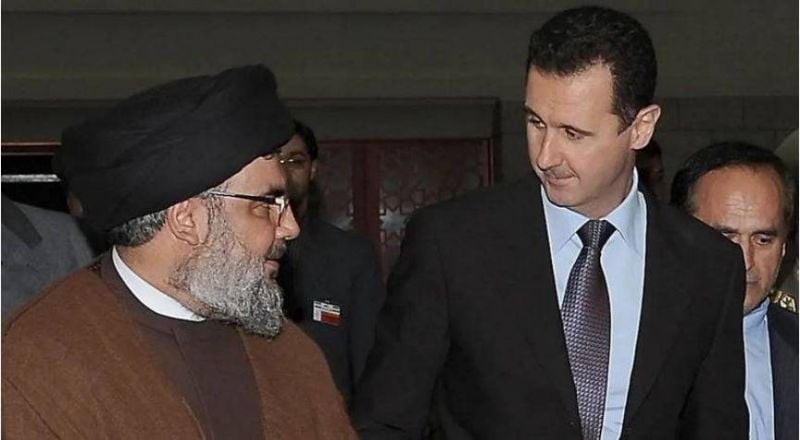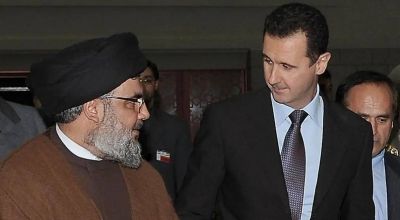
Hezbollah Secretary General Hassan Nasrallah and Syrian President Bashar al-Assad. (AFP archive photo)
Where there’s smoke there’s fire, as the saying goes.
The Syrian Embassy in Lebanon on Tuesday denied rumors that Damascus is interfering in the Lebanese parliamentary elections. Coming from a regime that has always had an influence in the internal politics of its neighbor, and that has not given up this project despite the war that has dragged on for more than ten years on its soil, the assertion is amusing. It comes in a context where opponents of the Syrian regime fear that the latter will take advantage of the upcoming parliamentary elections to regain a foothold in Lebanon, against a backdrop of rapprochement between Syria and some Gulf countries, the return of the petro-monarchies to Lebanon, and a growing competition between Hezbollah and the Damascus regime.
The Syrian president visited the United Arab Emirates in March, his first visit to an Arab country since 2011. According to information obtained by L’Orient-Le Jour, Bashar al-Assad assured his Emirati interlocutors that he had no political project in Lebanon but that he was ready to help Abu Dhabi through his Sunni allies or through Hezbollah. But the pro-Iranian party does not see this rapprochement with the Arab countries in a very good light, and its relations have cooled recently with Damascus, especially in the context of the Russian invasion of Ukraine, from which Iran has distanced itself.
Some analysts believe that Saudi Arabia, which believes that Lebanon will enter a decisive period after the elections, could seek Syria's help to reduce Iranian influence in Lebanon. The idea would be for Damascus's allies in Lebanon to form a parliamentary bloc independent of Hezbollah that might not align itself with the Shiite party in votes on a number of key decisions, such as the selection of the prime minister or the president of the Republic.
'No disagreement with Hezbollah'
This would explain why Hezbollah has dismissed several pro-Syrian candidates from the electoral lists, such as the secretary general of the Baath Party in Lebanon, Ali Hijazi, in Baalbeck-Hermel (Bekaa III), or Walid Sukkarieh, also in Baalbeck-Hermel (Bekaa III).
“With the exception of Jamil al-Sayyed [the former head of the General Security, candidate in the same district], Hezbollah wanted to get rid of candidates who are too close to Damascus," says a politician belonging to 8 March.
This account was half denied by a senior Hezbollah official speaking to L’Orient-Le Jour.
"Whatever the differences between the Syrian regime and Hezbollah, the two sides will find common ground to avoid any strategic conflict," he said, recalling that when the Syrian army left Lebanon, Hezbollah worked to ensure the protection and political survival of forces directly affiliated with the regime, especially within the Sunni community.
"Today, contacts [between the regime and Hezbollah] are resuming and strengthening, without disagreement from Hezbollah," he added.
Another party official, who also requested anonymity, put the differences with Damascus over the selection of candidates into perspective.
"It is pragmatism and not the issue of Damascus that prevails in the end," he said.
He cited as an example the fact that the party decided to support Deputy Parliament Speaker Elie Ferzli and the Free Patriotic Movement (FPM) candidate Charbel Maroun in Bekaa II (Bekaa West and Rachaya), rather than the Druze Tarek Daoud, the candidate close to Damascus, who has a slim chance of winning against Waël Bou Faour (from Walid Jumblatt's Progressive Socialist Party).
"The question is tactical, according to the priorities of the electoral battle, without necessarily pointing to disagreements at the strategic level," he said.
But according to information from L'Orient-Le Jour, the Syrian regime is indeed trying to push its pawns into several regions, starting with Akkar, where it benefits from the presence of the Alawite community, Lebanese citizens living in Syria and the remnants of the Baath party. The aim is to create a parliamentary bloc that is affiliated to it or that it can influence, which would include Sunni personalities such as Faisal Karami, Jihad al-Samad and Hassan Mrad, Jamil al-Sayyed, representatives of the Syrian National Social Party (SNSP) and some Christian personalities as well, including Elie Ferzli.
Will this lead to a distancing from Hezbollah? The test will take place after the parliamentary elections regarding a number of key steps, the first of which is the appointment of the prime minister — especially if Saudi Arabia wants to have the final say in the selection.
The positioning of Damascus's allies in relation to Hezbollah is also likely to become clearer on the occasion of the presidential election, especially if Hezbollah supports a particular figure and the Arab preference goes to someone else. This will highlight the extent of Arab influence on the Syrian decision and the regime's choice in this matter, whether it is Sleiman Frangieh, Gebran Bassil or someone else.
This article was originally published in French in L'Orient-Le Jour.
